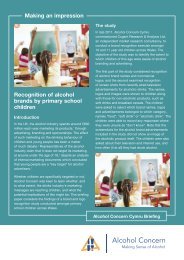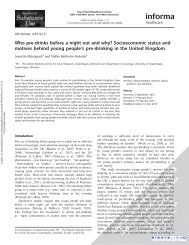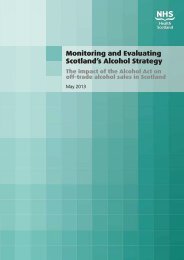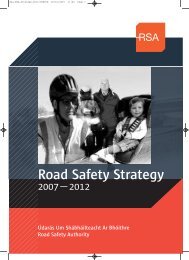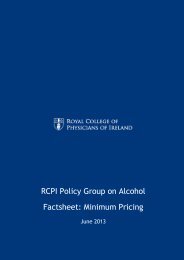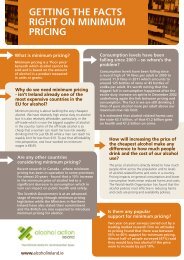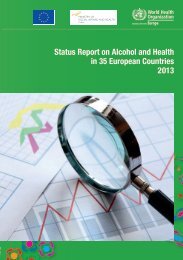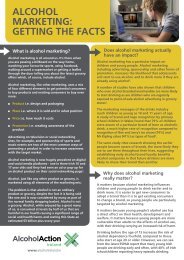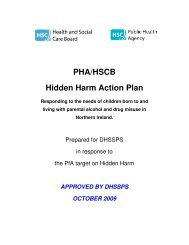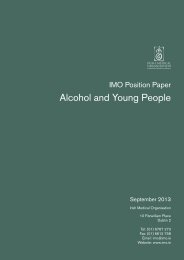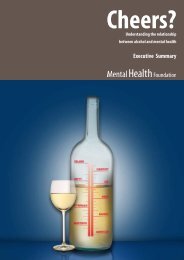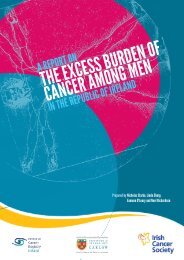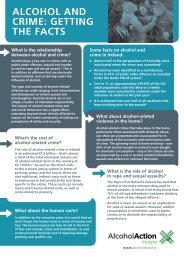Addressing the harmful use of alcohol - WHO Western Pacific Region
Addressing the harmful use of alcohol - WHO Western Pacific Region
Addressing the harmful use of alcohol - WHO Western Pacific Region
You also want an ePaper? Increase the reach of your titles
YUMPU automatically turns print PDFs into web optimized ePapers that Google loves.
7. Monitoring and enforcement<br />
concerned, although this may not be possible for appeals that go to a high court. Where no<br />
objections are received and no problems are anticipated or experienced, routine decisionmaking<br />
may proceed on <strong>the</strong> basis <strong>of</strong> applications and reports from statutory <strong>of</strong>ficers.<br />
Table 7.6 : Suggested legislative text<br />
Appeals<br />
1) Where <strong>the</strong> Licensing Authority:<br />
a) declines a licence application on grounds <strong>of</strong> <strong>the</strong> suitability <strong>of</strong> <strong>the</strong> applicant;<br />
b) declines an application for renewal <strong>of</strong> <strong>the</strong> licence;<br />
c) makes an order cancelling <strong>the</strong> licence<br />
<strong>the</strong> applicant or licensee may appeal for a review <strong>of</strong> that decision to (an Appeals Tribunal or<br />
<strong>the</strong> High Court) in writing within 10 working days <strong>of</strong> receiving <strong>the</strong> decision <strong>of</strong> <strong>the</strong> Authority.<br />
2) The decision or order <strong>of</strong> <strong>the</strong> Authority continues in force unless and until overturned by <strong>the</strong><br />
decision <strong>of</strong> <strong>the</strong> appeal body.<br />
Monitoring <strong>the</strong> operation <strong>of</strong> an <strong>alcohol</strong> control Act<br />
Differences in local circumstances, cultures and regulatory frameworks will mean that similar<br />
legislation and even similar options for implementation will play out differently in different<br />
countries. A licensing system, which may involve regulatory responsibilities by several<br />
agencies or at both local and national level as well different types <strong>of</strong> licensed business is likely<br />
to require a “bedding in” period after which it is appropriate to review how well <strong>the</strong> system is<br />
operating and what changes or adjustments can be made to improve its operation.<br />
It may be appropriate for <strong>the</strong> national <strong>alcohol</strong> policy underlying <strong>the</strong> legislation to include a<br />
requirement or expectation <strong>of</strong> an operational and legislative review after five years. Some<br />
jurisdictions also include a requirement in <strong>the</strong> legislation itself that <strong>the</strong> Act be reviewed after<br />
a set period <strong>of</strong> time.<br />
Depending on design, <strong>the</strong> law may allow minor changes, as licence application requirements,<br />
fees or fines, through regulations. Some changes will be merely operational. O<strong>the</strong>rs will<br />
require legislative amendment.<br />
The <strong>alcohol</strong> market is a changing one, with new products, new kinds <strong>of</strong> businesses emerging<br />
and new policy proposals in response. In countries with well-established licensing systems,<br />
some aspects <strong>of</strong> <strong>alcohol</strong> legislative are amended about once every ten years. This review<br />
may come as <strong>the</strong> result <strong>of</strong> political pressures or it can be part <strong>of</strong> on-going formal process <strong>of</strong><br />
periodic policy review.<br />
Return to TOC<br />
85



